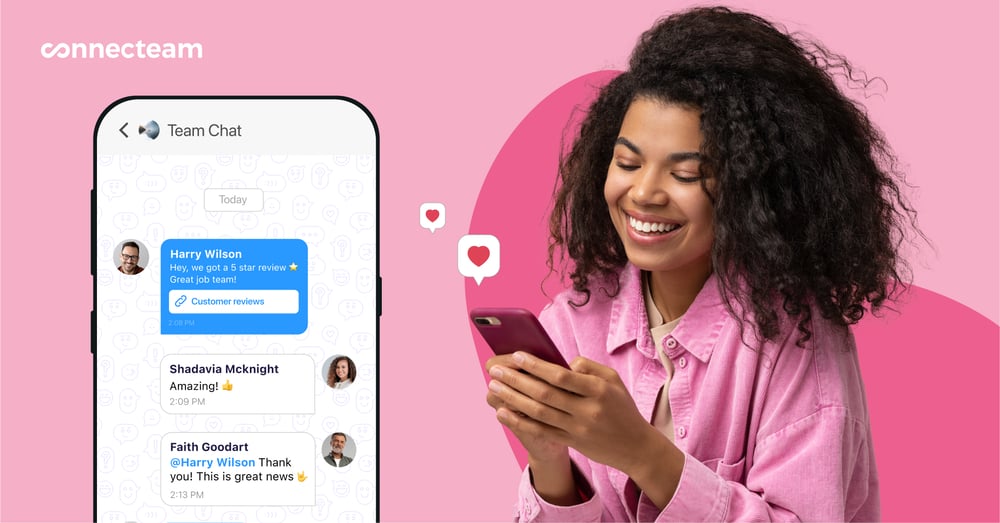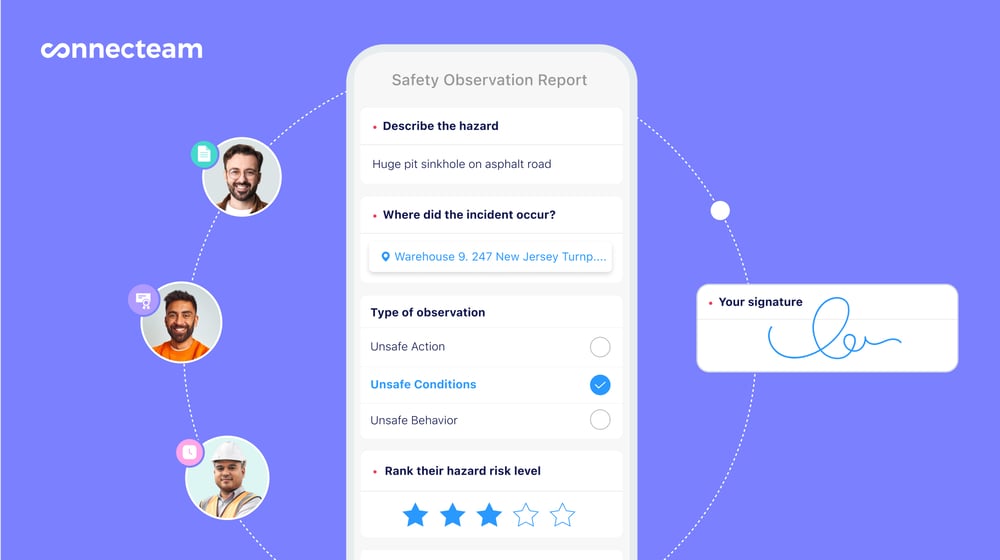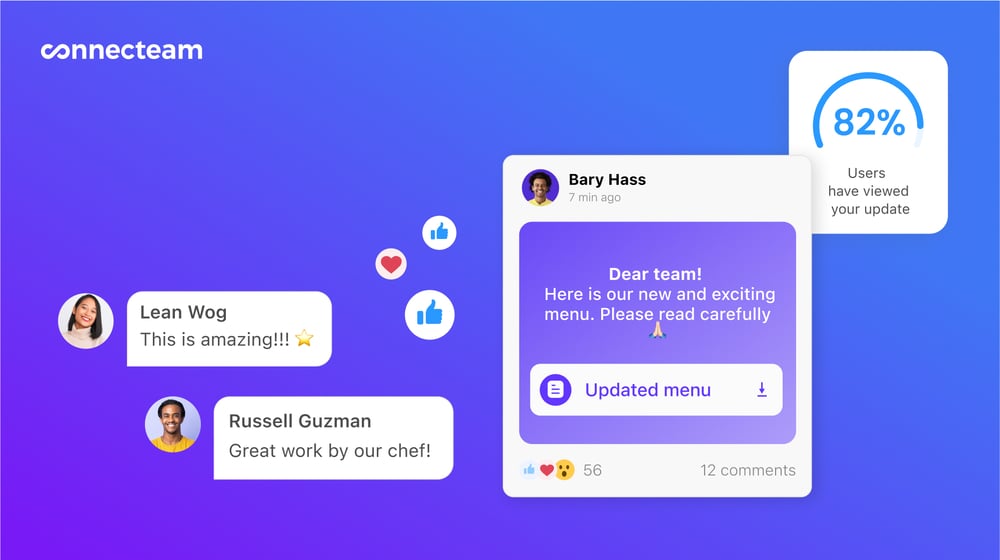Some companies still use social media platforms like Facebook for internal business communications. Most come to regret this decision.
Having a communications platform at your business can improve collaboration, teamwork, and productivity—if the system is reliable, secure, and offers the right features.
Facebook, originally used for social networking, lacks several essential tools needed for effective team communications.
But companies use it because it’s free and familiar—or because they’re unaware of the alternatives.
In this guide, I share 8 key reasons to stop using Facebook for internal communications and discuss a better alternative.
Key Takeaways
- Facebook may be good for social networking, but its data privacy and security concerns can put your company’s proprietary information at risk and lead to compliance issues.
- Its user interface and features are more suited to consuming personal content than engaging in work-related discussions.
- Requiring employees to use Facebook for work communications can make them uncomfortable and damage your reputation with customers and investors.
- Instead of Facebook, choose a platform like Connecteam that offers powerful communication and collaboration features, built especially for team communications.
8 Reasons To Stop Using Facebook for Internal Business Communications
Here are 8 reasons to avoid using Facebook for your company’s internal communications.
Data security and privacy concerns
Facebook has a history of privacy issues. One example is the Cambridge Analytica scandal in which private user data was taken without users’ knowledge or consent. This raised many concerns about data privacy and misuse.
This is a big red flag for businesses. Here’s why.
Privacy concerns
When employees use Facebook for work, sensitive information might be vulnerable to unauthorized access.
For instance, imagine an employee mistakenly shares confidential project details on their profiles or other pages when using Facebook for work and socializing. This puts your company’s and customers’ privacy at risk, exposing sensitive company data and damaging customer trust in your company.
Data security risks
Data breaches on Facebook or third-party apps linked to Facebook have compromised user data. Phishing, hacking, and other security attacks can compromise such information. This can put your company’s proprietary information or strategies at risk of exposure.
This Might Interest You
Read our article on the best internal communication software for 2026 to find one that keeps business chats secure and protects your sensitive information.
For instance, a worker might share financial projections through Facebook’s instant messaging feature, Facebook Messenger. A single data security breach could lead to the leakage of this critical information and cost you your competitive edge in the market.
Compliance issues
Certain industries have strict regulations on data handling and privacy. For example, healthcare and finance companies are bound by HIPAA and GDPR regulations, respectively. Facebook might not align with these standards. This could potentially lead to non-compliance and legal consequences for your company.
Pro Tip
Look for internal communication tools that better protect your company’s private information. Connecteam, for instance, can be used by company employees only. Chats can be exported to devices only with permission, and information is stored in a secure, private cloud. You can also control user permissions, moderate content, and prevent workers from forwarding messages.
Unsuitable user interface
At its core, Facebook was built to enable social networking and interaction between college students. Since then, individuals across all demographics have used it. However, its interface is limited when sharing work-related content.
Facebook’s feed is made for scrolling, providing users with updates from their Facebook “friends”, the pages they follow, and ads. This continuous stream of information isn’t suitable for the structured and focused nature of work discussions.
Further, while Facebook has groups and pages, these don’t organize information efficiently. For instance, you can’t categorize information by teams, projects, or topics.
Instead, you’ll need to create several chats using Facebook Messenger. This is inconvenient and messy, and it doesn’t offer an easy way to search and access information.

Did You Know?
Connecteam has an online team chat that lets you communicate in 1-on-1 or group settings. You can categorize chats by team, department, topic, and more, and add notes and files directly to the chat so information is neatly organized. The advanced search functionality also makes it easy to find.
Get started with Connecteam for free today!
Lack of customization and advanced features
Facebook also lacks many internal communication tools that support effective collaboration. Here are some examples.
Uncustomizable notifications
You can’t customize notifications for different types of messages, events, or updates based on employees’ roles. For instance, if you post an update to the company feed, Facebook will notify every employee. Need to notify only a few members? You’ll need to create yet another chat on Facebook Messenger.
Lack of automation
Good communication tools support automated responses, message routing, and custom workflows. Facebook lacks these advanced automation options.
Limited integrations
Facebook doesn’t seamlessly integrate with other systems like task or project management tools, document-sharing platforms, calendar and scheduling tools, communication tools, and so on. This means companies using Facebook must switch between platforms for work—increasing time, effort, and errors.
Poor security and permission controls
While Facebook allows for group creation and access control, you can’t set permissions at a granular level. For instance, you can’t tailor access to specific seniority levels, teams, or roles within the organization. You also can’t limit workers’ abilities to forward messages, download documents, and share files externally.
Fewer advanced calling features
While Facebook offers voice and video calling, it doesn’t have call recording and screen sharing. Plus, it doesn’t easily integrate with other communication tools.

Did You Know?
Connecteam’s chat links directly to its employee task tracking, employee scheduler, and digital forms. This way, workers can communicate about work and shifts, plus send you live updates from the field using a single user-friendly interface.
Get started with Connecteam for free today!
High distraction and poor productivity
Most employees use their Facebook accounts as their personal social media platforms. Constant notifications, trending topics, or personal instant messages can easily distract them.
Moreover, social media platforms are designed to keep users’ attention for as long as possible. This encourages workers to scroll through their news feeds for hours, leading to poor productivity and more mistakes.
This Might Interest You
Read our article on the best communication apps for 2026 to find one that keeps business and personal chats completely separate and reduces distractions during work hours.
Employee discomfort
Workers may also feel uneasy mixing their personal and professional communications on a platform intended for socializing. For instance, an employee might hesitate to discuss work-related matters in a space where their personal connections are members and vice-versa.
Further, using the same platform for personal and professional interactions can blur the boundaries between employees’ work and personal lives. Workers may want to access their Facebook profiles after work hours or over the weekend. Finding a ton of work notifications might make them feel obligated to respond. This can harm their work-life balance and lead to burnout.
Did You Know?
Encouraging employees to work off the clock without paying them is illegal. The Fair Labor Standards Act (FLSA) requires employers to pay employees for all hours worked.
Finally, not everyone has a Facebook account. They may not be comfortable using Facebook or want to avoid friend requests and unwanted communications from other Facebook users. Forcing them to create an account for team communications might make them uncomfortable and resentful of the company.
Pro Tip
Use an app that promotes better work-life harmony, reduces work-related stress for employees, and prevents off-the-clock work. For example, Connecteam not only keeps work and personal communications separate but also lets you schedule messages to be sent when an employee next clocks in.
Lack of employee engagement and analytics tools
The best communication apps offer tools that improve employee engagement. While Facebook is known for engaging users, its features are geared towards social and commercial purposes. It lacks the features that foster employee engagement at work.
Facebook lets workers leave reactions such as likes and dislikes on company posts. Employees can even add comments providing their opinions and ideas. But, gathering and using this data effectively for company decision-making isn’t easy. You must scroll through your entire feed and manually check which posts received the most likes or read through everyone’s comments.
Moreover, Facebook doesn’t provide advanced analytics and reporting features. This means you can’t track usage, monitor engagement at a macro level, and gather insights about how employees communicate with each other. Thus, while it provides a basic platform for messaging, Facebook doesn’t actually enhance workplace communications or employee engagement.

Did You Know?
Connecteam has a newsfeed to post company and employee updates and recognize workers’ accomplishments. Its reporting and analytics tools let you track engagement and see what topics are trending among employees. That’s not all—Connecteam also offers built-in employee communication surveys, polls, and suggestion boxes to collect workers’ feedback.
Get started with Connecteam for free today!
Low platform control
Facebook, like any online platform, can experience downtime or technical glitches. Expect delays or disruptions if you’re relying on it for important discussions or time-sensitive decisions. Also, without a dedicated account manager, you often won’t know how long Facebook is expected to be down during these times.
Additionally, depending on Facebook means surrendering control over updates, policies, and platform changes. For example, Facebook underwent a mandatory change to its interface in 2020 that impacted all users, including companies. This disrupted internal communications for those companies until workers learned to navigate the changes.
While employee-focused communication platforms can experience changes, too, those changes are focused on improving the business experience. Facebook’s changes focus on the social experience.
Further, the platform undergoes frequent changes to its privacy and data handling policies. This can impact internal communications and often comes as a surprise to businesses that need to adapt swiftly.
Pro Tip
You should use internal communication apps designed for business use. They offer more predictability and often let you choose when to implement updates and changes. This way, you can ensure minimal disruption to work.
Unprofessional image
Using a social networking tool for your company’s internal communications can tarnish your reputation. Customers, investors, and even job candidates might view it as unprofessional and take you less seriously.
Further, an informal platform for work use might affect the structure and tone of workers’ communication. This may be okay internally but could impact communications with external partners and clients and lead to problems. Furthermore, it may create an impression of your company culture being more casual than you want it to be.
What To Use Instead of Facebook: An Employee Communication Platform
With all of Facebook’s downsides, companies should use employee communication platforms for internal business communications. These are more secure and better suited to business needs, offer customization and advanced features, and more.
For instance, Connecteam is a great solution, offering instant messaging designed for work. Connecteam puts you in control of work chats and enables you to keep communications compliant with company standards, relevant data protection and privacy laws, and off-the-clock work laws.
The app’s dedicated work-oriented interfaces ensure a focused and professional communication experience, free from the distractions that plague Facebook users.
The Bottom Line on Using Facebook for Internal Business Communication
Many companies use Facebook for internal communications because it’s cost-effective and familiar. However, Facebook lacks many essential features for effective business communication. Using it for work can also make employees uncomfortable and damage your reputation as a professional business. Plus, it poses privacy and security risks that can lead to compliance issues for your company.
Instead, consider using a communication platform like Connecteam that’s designed to support internal business communications. It offers several powerful features like an in-app chat, newsfeed, surveys and polls, task management, and more. Plus, it’s end-to-end encrypted and lets you set security controls at a granular level.
Get started with Connecteam for free to explore its full range of internal communication tools.
FAQs
What is a Facebook business page?
Facebook business pages are public business profiles companies create to engage with their target audiences, advertise and showcase products and services, and drive sales. Some companies also offer customer service through their Facebook business page. While Facebook can be used for marketing and customer communications, it’s not an effective internal communications tool.
What are the best free communication apps for internal company use?
A tight budget doesn’t mean you need social media for company communications. One of the best free communication apps for internal company use is Connecteam. Businesses with fewer than 10 users can use the app completely free.



![image of [Free eBook] Building an Effective Internal Communication Strategy](https://connecteam.com/wp-content/uploads/2020/07/Scene-4-768x512.png)